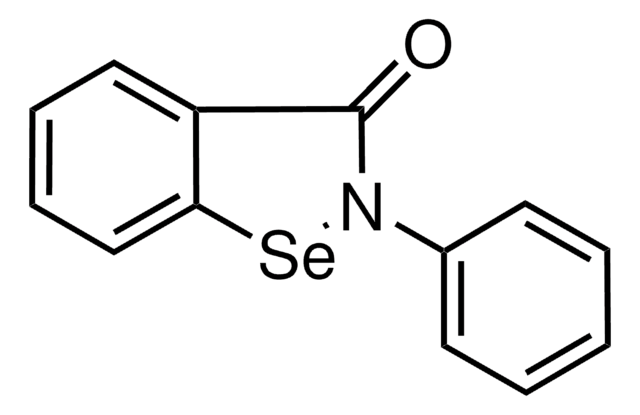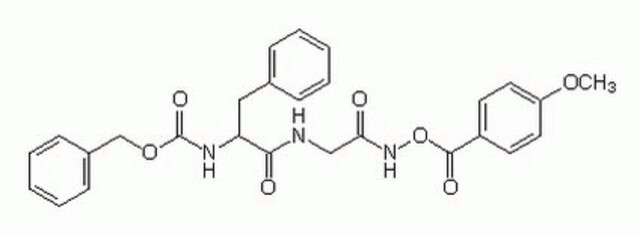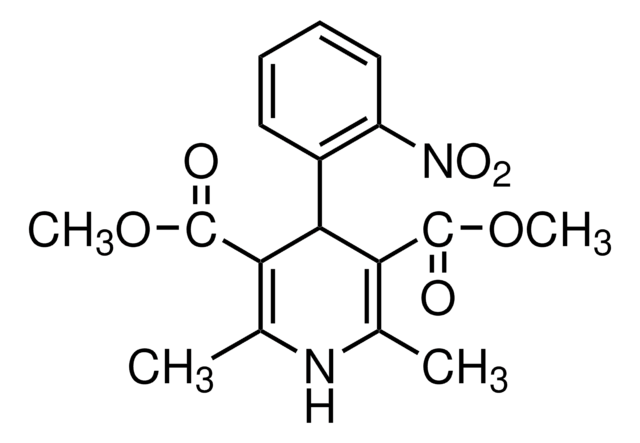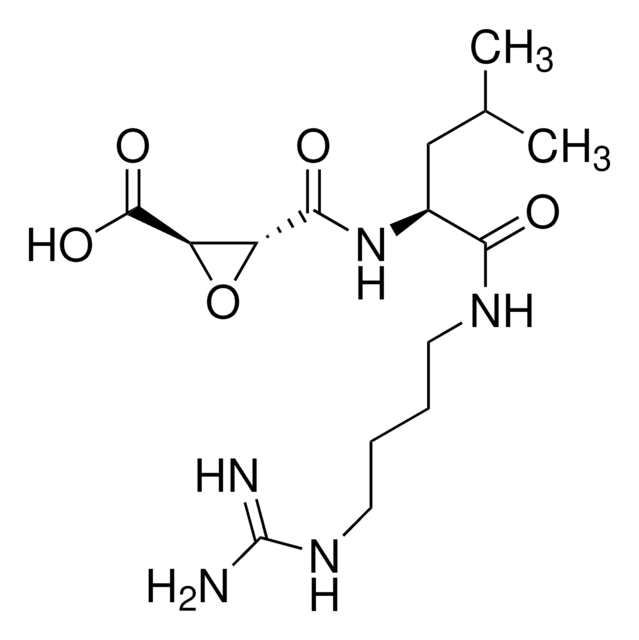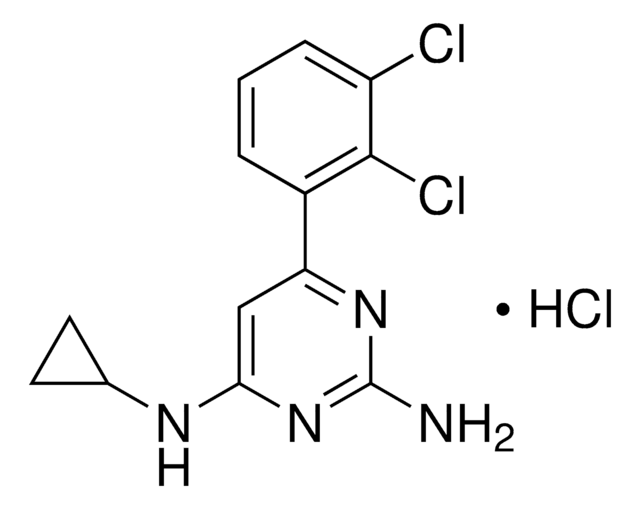Wszystkie zdjęcia(1)
Kluczowe dokumenty
C1480
Z-Phe-Ala fluoromethyl ketone
≥90% (TLC), powder
Synonim(y):
Z-FA-FMK
Zaloguj sięWyświetlanie cen organizacyjnych i kontraktowych
About This Item
Wzór liniowy:
C21H23N2O4F
Masa cząsteczkowa:
386.42
Numer MDL:
Kod UNSPSC:
12352209
Identyfikator substancji w PubChem:
NACRES:
NA.77
Polecane produkty
Poziom jakości
Próba
≥90% (TLC)
Formularz
powder
kolor
white to off-white
rozpuszczalność
DMSO or DMF: 20 mM
Warunki transportu
dry ice
temp. przechowywania
−20°C
ciąg SMILES
C[C@H](NC(=O)[C@H](Cc1ccccc1)NC(=O)OCc2ccccc2)C(=O)CF
InChI
1S/C21H23FN2O4/c1-15(19(25)13-22)23-20(26)18(12-16-8-4-2-5-9-16)24-21(27)28-14-17-10-6-3-7-11-17/h2-11,15,18H,12-14H2,1H3,(H,23,26)(H,24,27)/t15-,18-/m0/s1
Klucz InChI
ASXVEBPEZMSPHB-YJBOKZPZSA-N
Zastosowanie
Z-Phe-Ala fluoromethyl ketone (Z-FA-FMK) has been used as a:
- cathepsin inhibitor to study its effects on dendritic cells
- papain-like cysteine protease inhibitor to study its effects on cadmium-induced mitochondrial apoptosis
- cysteine protease inhibitor to study its effects on the interaction of toll-like receptor 9 (TLR9) with granulin in RAW macrophages
Działania biochem./fizjol.
Z-Phe-Ala fluoromethyl ketone (Z-FA-FMK) is an inhibitor of cysteine proteases, such as cathepsin B and L. It can also inhibit recombinant effector caspases 2, -3, -6, and -7 and not initiator caspases 8 and -10. Z-FA-FMK plays a role in blocking nuclear factor κ-light-chain-enhancer of activated B cells (NF-κB) transactivation. It exhibits therapeutic effects against rheumatoid arthritis.
Ta strona może zawierać tekst przetłumaczony maszynowo.
Kod klasy składowania
11 - Combustible Solids
Klasa zagrożenia wodnego (WGK)
WGK 3
Temperatura zapłonu (°F)
Not applicable
Temperatura zapłonu (°C)
Not applicable
Środki ochrony indywidualnej
Eyeshields, Gloves, type N95 (US)
Wybierz jedną z najnowszych wersji:
Masz już ten produkt?
Dokumenty związane z niedawno zakupionymi produktami zostały zamieszczone w Bibliotece dokumentów.
Transcription factor E3 protects against cadmium-induced apoptosis by maintaining the lysosomal-mitochondrial axis but not autophagic flux in Neuro-2a cells
Pi H, et al.
Toxicology Letters, 295(4), 335-350 (2018)
Yun-Pei Zhang et al.
American journal of physiology. Gastrointestinal and liver physiology, 311(6), G1091-G1104 (2016-10-30)
LPS-induced microvascular hyperpermeability and hemorrhage play a key role in the development of sepsis, the attenuation of which might be an important strategy to prevent sepsis. However, the current clinical therapies have proven to be inefficient in improving the prognosis
Man Kyu Shim et al.
Journal of controlled release : official journal of the Controlled Release Society, 294, 376-389 (2018-12-15)
Cancer nanomedicine using nanoparticle-based delivery systems has shown outstanding promise in recent decades for improving anticancer treatment. However, limited targeting efficiency, low drug loading efficiency and innate toxicity of nanoparticles have caused severe problems, leaving only a few available in
Michael J Mitchell et al.
Nature communications, 8, 14179-14179 (2017-03-21)
Physical forces affect tumour growth, progression and metastasis. Here, we develop polymeric mechanical amplifiers that exploit in vitro and in vivo physical forces to increase immune cytokine-mediated tumour cell apoptosis. Mechanical amplifiers, consisting of biodegradable polymeric particles tethered to the
Katherine A Staines et al.
Journal of cellular physiology, 231(6), 1392-1404 (2015-12-08)
The transmembrane glycoprotein E11 is considered critical in early osteoblast-osteocyte transitions (osteocytogenesis), however its function and regulatory mechanisms are still unknown. Using the late osteoblast MLO-A5 cell line we reveal increased E11 protein/mRNA expression (P < 0.001) concomitant with extensive osteocyte dendrite
Nasz zespół naukowców ma doświadczenie we wszystkich obszarach badań, w tym w naukach przyrodniczych, materiałoznawstwie, syntezie chemicznej, chromatografii, analityce i wielu innych dziedzinach.
Skontaktuj się z zespołem ds. pomocy technicznej


